
Darwin Rebellion
Encyclopedia
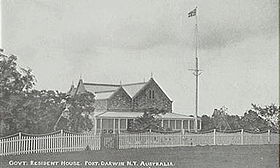
Australian Workers' Union
The Australian Workers' Union is one of Australia's largest and oldest trade unions. It traces its origins to unions founded in the pastoral and mining industries in the 1880s, and currently has approximately 135,000 members...
which had grown between 1911 and 1919. Led by Harold Nelson
Harold Nelson (Australian politician)
Harold George Nelson was the inaugural member for the Northern Territory in the Australian House of Representatives....
, some 1000 demonstrators
Demonstration (people)
A demonstration or street protest is action by a mass group or collection of groups of people in favor of a political or other cause; it normally consists of walking in a mass march formation and either beginning with or meeting at a designated endpoint, or rally, to hear speakers.Actions such as...
marched on Government House
Government House, Darwin
Government House, Darwin is the office and official residence of the Administrator of the Northern Territory. Built between 1870 and 1878, the building is set on 13,000 square metres of hillside gardens in the centre of the Darwin business district, on The Esplanade.-History:Government House is...
at Liberty Square in Darwin
Darwin, Northern Territory
Darwin is the capital city of the Northern Territory, Australia. Situated on the Timor Sea, Darwin has a population of 127,500, making it by far the largest and most populated city in the sparsely populated Northern Territory, but the least populous of all Australia's capital cities...
, Northern Territory
Northern Territory
The Northern Territory is a federal territory of Australia, occupying much of the centre of the mainland continent, as well as the central northern regions...
, Australia where they burnt an effigy
Effigy
An effigy is a representation of a person, especially in the form of sculpture or some other three-dimensional form.The term is usually associated with full-length figures of a deceased person depicted in stone or wood on church monuments. These most often lie supine with hands together in prayer,...
of the Administrator of the Northern Territory
Administrator of the Northern Territory
The Administrator of the Northern Territory is an official appointed by the Governor-General of Australia to exercise powers analogous to that of a state governor...
, John Gilruth
John A. Gilruth
John Anderson Gilruth was a veterinary scientist and administrator. He is particularly noted for being Administrator of the Northern Territory from 1912 to 1918, when he was recalled after an angry mob demanded that he resign...
, and demanded his resignation.
Their grievances were against the two main Northern Territory employers, Vestey’s Meatworks
Vestey Group
The Vestey Group is a privately owned UK group of companies, comprising an international food product business and significant cattle ranching and sugar cane farming interests in Brazil and Venezuela.-Business origins:William...
and the Commonwealth of Australia, and concerned political representation
Representation (politics)
In politics, representation describes how some individuals stand in for others or a group of others, for a certain time period. Representation usually refers to representative democracies, where elected officials nominally speak for their constituents in the legislature...
, unemployment
Unemployment
Unemployment , as defined by the International Labour Organization, occurs when people are without jobs and they have actively sought work within the past four weeks...
and taxation
Taxation in Australia
There are many forms of taxation in Australia. Individuals and companies in Australia may be required to pay taxes or charges to all levels of government: local, state, and federal governments...
. Gilruth left Darwin soon afterwards under the protection of , while the Vestey company permanently closed its Darwin operations in 1920.
Background
From 1863 until 1911 Northern TerritoryNorthern Territory
The Northern Territory is a federal territory of Australia, occupying much of the centre of the mainland continent, as well as the central northern regions...
residents were entitled to vote in both South Australia
South Australia
South Australia is a state of Australia in the southern central part of the country. It covers some of the most arid parts of the continent; with a total land area of , it is the fourth largest of Australia's six states and two territories.South Australia shares borders with all of the mainland...
n and Commonwealth elections. This status had also enabled Territorians to qualify as South Australian voters in elections for both Houses of the Commonwealth Parliament
Parliament
A parliament is a legislature, especially in those countries whose system of government is based on the Westminster system modeled after that of the United Kingdom. The name is derived from the French , the action of parler : a parlement is a discussion. The term came to mean a meeting at which...
after Federation
Federation of Australia
The Federation of Australia was the process by which the six separate British self-governing colonies of New South Wales, Queensland, South Australia, Tasmania, Victoria and Western Australia formed one nation...
in 1901.
On 1 January 1911 the transfer of the Northern Territory to the Commonwealth government deprived Territorians of all political representation and voting rights. The Commonwealth Constitution did not allow for Federal electorates to cross state borders. This enabled national governments to avoid a hypothetical impasse where a thousand Territory voters might some day hold the balance of power in an evenly divided Commonwealth Parliament. Of the 4.5 million white Australians living on the continent, only 1,729 lived in the Northern Territory, along with about 1,300 Chinese
Chinese people
The term Chinese people may refer to any of the following:*People with Han Chinese ethnicity ....
and an unknown number of Aborigines
Indigenous Australians
Indigenous Australians are the original inhabitants of the Australian continent and nearby islands. The Aboriginal Indigenous Australians migrated from the Indian continent around 75,000 to 100,000 years ago....
.
Following the transfer, the Northern Territory was run by an administrator appointed by the Commonwealth executive, a public servant
Civil service
The term civil service has two distinct meanings:* A branch of governmental service in which individuals are employed on the basis of professional merit as proven by competitive examinations....
answerable to the Commonwealth. In the years following Commonwealth Administration, Territorians became increasingly unhappy with unrepresentative government from southern Australia. The Northern Territory's few economic pursuits—pearling
Pearl hunting
Pearl hunting or pearl diving refers to a largely obsolete method of retrieving pearls from pearl oysters, freshwater pearl mussels and, on rare occasions, other nacre-producing molluscs, such as abalone.-History:...
, pastoralism
Pastoralism
Pastoralism or pastoral farming is the branch of agriculture concerned with the raising of livestock. It is animal husbandry: the care, tending and use of animals such as camels, goats, cattle, yaks, llamas, and sheep. It may have a mobile aspect, moving the herds in search of fresh pasture and...
, and mining
Mining
Mining is the extraction of valuable minerals or other geological materials from the earth, from an ore body, vein or seam. The term also includes the removal of soil. Materials recovered by mining include base metals, precious metals, iron, uranium, coal, diamonds, limestone, oil shale, rock...
—were all run down. Expected Commonwealth-led development dissipated as Federal funding was diverted towards Australia's participation in World War I
World War I
World War I , which was predominantly called the World War or the Great War from its occurrence until 1939, and the First World War or World War I thereafter, was a major war centred in Europe that began on 28 July 1914 and lasted until 11 November 1918...
. Consequently, conflict between labour unions and the Northern Territory administration began to grow.
Dr. John A. Gilruth
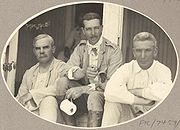
Prime Minister of Australia
The Prime Minister of the Commonwealth of Australia is the highest minister of the Crown, leader of the Cabinet and Head of Her Majesty's Australian Government, holding office on commission from the Governor-General of Australia. The office of Prime Minister is, in practice, the most powerful...
Andrew Fisher
Andrew Fisher
Andrew Fisher was an Australian politician who served as the fifth Prime Minister on three separate occasions. Fisher's 1910-13 Labor ministry completed a vast legislative programme which made him, along with Protectionist Alfred Deakin, the founder of the statutory structure of the new nation...
invited him to join a scientific mission to investigate the potential of the Northern Territory. He was later given the position of Administrator of the Northern Territory
Administrator of the Northern Territory
The Administrator of the Northern Territory is an official appointed by the Governor-General of Australia to exercise powers analogous to that of a state governor...
. Gilruth's appointment sparked his enthusiasm for economic development of the Northern Territory by means of "mining, crop-growing and pastoralism".
From the beginning, Gilruth's plans did not progress as planned. He did his best to promote mining and agriculture, including the development of a meatworks in Darwin by the English
England
England is a country that is part of the United Kingdom. It shares land borders with Scotland to the north and Wales to the west; the Irish Sea is to the north west, the Celtic Sea to the south west, with the North Sea to the east and the English Channel to the south separating it from continental...
firm, Vesteys
Vestey Group
The Vestey Group is a privately owned UK group of companies, comprising an international food product business and significant cattle ranching and sugar cane farming interests in Brazil and Venezuela.-Business origins:William...
. However, these attempts to achieve economic development proved disappointing. With the outbreak of World War I
World War I
World War I , which was predominantly called the World War or the Great War from its occurrence until 1939, and the First World War or World War I thereafter, was a major war centred in Europe that began on 28 July 1914 and lasted until 11 November 1918...
in August 1914, the Commonwealth government lost interest in development of the Northern Territory as Federal funds were diverted towards the war.
As a consequence, the weight of public frustration fell upon Gilruth. However, his own character and actions helped to bring about that result. Gilruth was described as "headstrong and domineering". His blunt, dynamic style of leadership
Leadership
Leadership has been described as the “process of social influence in which one person can enlist the aid and support of others in the accomplishment of a common task". Other in-depth definitions of leadership have also emerged.-Theories:...
was also seen as being arrogant, insensitive and "not fitted to rule a democratic people". He went to Darwin predisposed "to treat the Chinese with reserve, the Aboriginals with heavy-handed paternalism
Paternalism
Paternalism refers to attitudes or states of affairs that exemplify a traditional relationship between father and child. Two conditions of paternalism are usually identified: interference with liberty and a beneficent intention towards those whose liberty is interfered with...
and the white trade unionists with suspicion". Gilruth constantly clashed with trade unionists, employers, workers and even his own officers. With Gilruth hindered by the Commonwealth government, "which neither gave him the powers he needed to rule effectively nor evolved consistent policies for the region", a confrontation between his administration and the townspeople was inevitable.
The 1913 strike
The construction of the railway line from Port Darwin to Pine CreekPine Creek, Northern Territory
Pine Creek is a small town in the Katherine region of the Northern Territory, Australia. According to the 2001 Australian census 665 people live in Pine Creek, which is the fourth largest town between Darwin and Alice Springs....
in the late 1880s required the immigration of Chinese labour. In December 1888, the South Australian Chinese Immigration Act came into effect, effectively putting a stop to the immigration increase. Those Chinese workers already in Darwin had proved themselves reliable, hard-working and good citizens. After the decline of the gold rush
Australian gold rushes
The Australian gold rush started in 1851 when prospector Edward Hammond Hargraves claimed the discovery of payable gold near Bathurst, New South Wales, at a site Edward Hargraves called Ophir.Eight months later, gold was found in Victoria...
, the Chinese population competed for jobs with the White
White people
White people is a term which usually refers to human beings characterized, at least in part, by the light pigmentation of their skin...
population. Not only did Asians compete successfully against Europeans for jobs that were scarce, but they also diversified into other profitable areas such as vegetable growing and tailoring. Consequently, the retail trade was almost entirely in Chinese hands and their success was resented by Europeans.
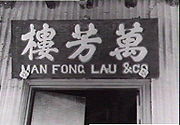
On 9 January 1911, the Fisher Labor Government
Andrew Fisher
Andrew Fisher was an Australian politician who served as the fifth Prime Minister on three separate occasions. Fisher's 1910-13 Labor ministry completed a vast legislative programme which made him, along with Protectionist Alfred Deakin, the founder of the statutory structure of the new nation...
issued a Ministerial instruction to implement the White Australia policy
White Australia policy
The White Australia policy comprises various historical policies that intentionally restricted "non-white" immigration to Australia. From origins at Federation in 1901, the polices were progressively dismantled between 1949-1973....
. With the threat of Chinese competition reduced, European workers were able to bargain for higher rates of pay. Needing an organisation to represent workers' interests, the Darwin Australian Workers' Union
Australian Workers' Union
The Australian Workers' Union is one of Australia's largest and oldest trade unions. It traces its origins to unions founded in the pastoral and mining industries in the 1880s, and currently has approximately 135,000 members...
(AWU) came into existence in 1912. Gilruth was given a free hand to deal with the situation in Darwin and arrived in the midst of a long pay dispute involving wharf lumpers and shipping agents. AWU representatives met with Gilruth several times in 1912 and 1913, but little was resolved.
When the government lowered the wages of survey field hands in April 1913, the AWU conducted a secret ballot amongst its members, which overwhelmingly supported a general strike
Strike action
Strike action, also called labour strike, on strike, greve , or simply strike, is a work stoppage caused by the mass refusal of employees to work. A strike usually takes place in response to employee grievances. Strikes became important during the industrial revolution, when mass labour became...
commencing 28 April. Although the Darwin strike was in itself insignificant, the threat of widespread national disruption if Chinese labour were used to keep the northern port operational, was significant. After weeks of strike action, the union reserves were empty of strike funds, the parent AWU in Townsville hostile to the whole event, the Federal government indifferent and a number of strikers back at work, it was evident that strike action was lost. In late May, AWU representatives met with Gilruth to negotiate their terms of surrender; the unionists were prepared to return to work as long as the strikers were reinstated to their former positions. Not content with his devastating victory, Gilruth refused, "wanting to eliminate all traces of unionism in the Northern Territory". Although the strike was called off in the first week of June, it shaped future industrial relations in the Northern Territory, as the "White Australia" policy and anti-Chinese feeling fuelled support for the Unions.
Vesteys meatworks
Gilruth had correctly envisaged that, for the foreseeable future, large-scale private enterprise in Darwin would be based on the mining, agriculture and cattle industries. The large British conglomerate, Vestey BrothersVestey Group
The Vestey Group is a privately owned UK group of companies, comprising an international food product business and significant cattle ranching and sugar cane farming interests in Brazil and Venezuela.-Business origins:William...
, proposed setting up a meat processing plant in Darwin and work commenced on this in 1914. An analysis of the negotiations suggested that neither the government nor Vestey Brothers were fully confident of the success of the venture they were about to undertake. It also showed that Gilruth, as the middleman, was thoroughly influential in its outcome. It was largely through his efforts that Vestey Brothers finally consented to building a meatworks in Darwin.
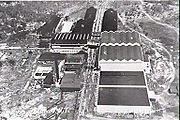
Strike action
Strike action, also called labour strike, on strike, greve , or simply strike, is a work stoppage caused by the mass refusal of employees to work. A strike usually takes place in response to employee grievances. Strikes became important during the industrial revolution, when mass labour became...
. As a consequence, Vestey's could not make the meatworks profitable. Its temporary closure in 1917 significantly affected the already struggling Territory economy by putting hundreds of workers out of work. Additionally, a conspiracy was reportedly uncovered between the Government and Vestey's regarding the illegal takeover of a large pastoral property. Gilruth was alleged to have distributed significant bribes, and H.E. Carey—who was both Government Secretary and the Chief Clerk at the meatworks—was accused of collusion
Collusion
Collusion is an agreement between two or more persons, sometimes illegal and therefore secretive, to limit open competition by deceiving, misleading, or defrauding others of their legal rights, or to obtain an objective forbidden by law typically by defrauding or gaining an unfair advantage...
.
It was widely thought that Vestey Brothers, with its experience in similar ventures elsewhere and access to substantial capital, would be able to develop large-scale cattle rearing in the Territory without signicant government intervention. Cattle was the one commodity that Northern Australia produced in large numbers. It was thought that Gilruth and the Federal government fullly supported Vestey's plans.
From the time of the meatworks establishment in 1914, until its permanent closure seven years later in 1920, Vestey's Darwin venture existed in a vacuum filled only by the emergent Australian Workers' Union
Australian Workers' Union
The Australian Workers' Union is one of Australia's largest and oldest trade unions. It traces its origins to unions founded in the pastoral and mining industries in the 1880s, and currently has approximately 135,000 members...
(AWU) and by World War I. During that time, Gilruth came to matter less and less as the AWU gathered strength under the leadership of Harold Nelson.
Palmerston District Council
The Palmerston (Darwin) District CouncilCity of Darwin
The City of Darwin is a Local Government Area of the Northern Territory, Australia. It includes the central business district of the capital, Darwin, and represents two-thirds of its metropolitan population. The City covers an area of 112 km² and has a estimated population of 75,908...
was established by proclamation in 1874, with representatives elected on a ratepayer franchise. On 4 February 1915 the Minister for External Affairs
Minister for Foreign Affairs (Australia)
In the Government of Australia, the Minister for Foreign Affairs is responsible for overseeing the international diplomacy section of the Department of Foreign Affairs and Trade. In common with international practice, the office is often informally referred to as Foreign Minister...
, Hugh Mahon
Hugh Mahon
Hugh Mahon was an Irish-born Australian politician and a member of the first Commonwealth Parliament for the Australian Labor Party...
, decided to abolish the Council, thus depriving Territorians of their slight vestige of democratic government. He gave as his reasons that "the District Council had blocked the government at every move". The new council would be replaced by two representatives of the government and two elected by the ratepayers, with Carey as Chairman
Chair (official)
The chairman is the highest officer of an organized group such as a board, committee, or deliberative assembly. The person holding the office is typically elected or appointed by the members of the group. The chairman presides over meetings of the assembled group and conducts its business in an...
. In effect, this gave Gilruth increased powers.
The abolition of the Palmerston District Council was a political error, but at first neither the Minister nor Gilruth saw it. The Council's importance, however, lay in the fact that it was "the only symbol of representative government and democracy
Democracy
Democracy is generally defined as a form of government in which all adult citizens have an equal say in the decisions that affect their lives. Ideally, this includes equal participation in the proposal, development and passage of legislation into law...
in the Northern Territory", and was made up of a small but influential middle class
Middle class
The middle class is any class of people in the middle of a societal hierarchy. In Weberian socio-economic terms, the middle class is the broad group of people in contemporary society who fall socio-economically between the working class and upper class....
of Darwin, such as shipping agents, mine owners, landlord
Landlord
A landlord is the owner of a house, apartment, condominium, or real estate which is rented or leased to an individual or business, who is called a tenant . When a juristic person is in this position, the term landlord is used. Other terms include lessor and owner...
s and ranking public servants. These were the people whose support Gilruth needed, but instead the Minister's announcement further alienated Gilruth from the townspeople.
The Prime Minister was not concerned, as his colleagues were about the troubles in Darwin. He dismissed the matter, saying that it was "a healthy sign, showing that people are alive to their own interests". In the weeks that followed the announcement of the demise of the Palmerston District Council, support for the AWU
Australian Workers' Union
The Australian Workers' Union is one of Australia's largest and oldest trade unions. It traces its origins to unions founded in the pastoral and mining industries in the 1880s, and currently has approximately 135,000 members...
organiser, Harold Nelson, rapidly grew. In a time of rigid social structure
Social class
Social classes are economic or cultural arrangements of groups in society. Class is an essential object of analysis for sociologists, political scientists, economists, anthropologists and social historians. In the social sciences, social class is often discussed in terms of 'social stratification'...
, it was evident that men of all classes united in the pursuit of a common aim behind Nelson. Ignoring growing discontent, Gilruth chose instead to distance himself even further, by moving to take over the hotels.
Nationalisation of hotels
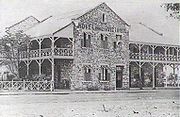
Melbourne
Melbourne is the capital and most populous city in the state of Victoria, and the second most populous city in Australia. The Melbourne City Centre is the hub of the greater metropolitan area and the Census statistical division—of which "Melbourne" is the common name. As of June 2009, the greater...
nationalised the supply of liquor in the northern part of the Territory. The legislation was ostensibly aimed at Chinese 'sly-groggers' often accused of selling low quality liquor, but in effect was designed to curb consumption of alcohol in northern Australia and provide some revenue to the Federal budget. Known as the 'government-takeover', penalties were steep and costs of administration and auditing the hotels rose rapidly. There were also some adverse side-effects with the closure of several popular hotels and the appointment by Gilruth of a 'supervisor of hotels', at a high salary. As a result of the takeover, the price of beer and whisky rapidly increased. Gilruth had also ordered the closure of the public bar in the popular Victoria Hotel
Victoria Hotel, Darwin
The Victoria Hotel, or The Vic as it is commonly known, is a heritage listed pub located in Darwin, Northern Territory, Australia. Built in 1890, it is an important historical building and tourist attraction of inner Darwin.- History :...
and consequently, the hotel was losing profits.
In 1918, several station owners and businessmen abandoned the Territory, including the manager of the State Liquor Department, because of Gilruth's policies. However, the mistake that helped finish Gilruth's career in the Territory, was trivial. As Darwinites prepared to celebrate the end of the war, the women employed in the state hotels asked for a few hours off on Saturday, 14 November to join in the celebrations. The hotel boarders agreed to dine elsewhere and everybody presumed the matter was closed. However, Gilruth subsequently refused to concede leave for the women, who took the time off anyway. When they returned to work the next day, they found themselves locked out by order of the Administrator. It was also reported that Gilruth refused permission for a ship to unload 700 cases of beer for the town's Christmas
Christmas
Christmas or Christmas Day is an annual holiday generally celebrated on December 25 by billions of people around the world. It is a Christian feast that commemorates the birth of Jesus Christ, liturgically closing the Advent season and initiating the season of Christmastide, which lasts twelve days...
supplies.
On Saturday afternoon, 7 December, there was a meeting at Darwin Oval, attended by several hundred people, about ever-increasing alcohol prices and the reopening of the Victoria Hotel public bar. On 16 December, Nelson met with the Police Inspector and asked for permission to stage a peaceful protest march from Parap
Parap, Northern Territory
Parap is an inner suburb of the city of Darwin, Northern Territory, Australia.-History:Parap derived its name from that applied by Dr John A Gilruth, first Commonwealth Administrator in 1912. He applied the name Paraparap , but had to abbreviate it to Parap later during his term...
to Government House. The Police Inspector gave permission on the condition there would be no violence.
Rebellion
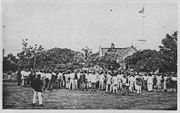
No taxation without representation
"No taxation without representation" is a slogan originating during the 1750s and 1760s that summarized a primary grievance of the British colonists in the Thirteen Colonies, which was one of the major causes of the American Revolution...
", behind a car carrying an effigy
Effigy
An effigy is a representation of a person, especially in the form of sculpture or some other three-dimensional form.The term is usually associated with full-length figures of a deceased person depicted in stone or wood on church monuments. These most often lie supine with hands together in prayer,...
of Gilruth tied to a stake. A deputation presented a motion to Gilruth that stated in part:
- "We, the citizens of Darwin here assembled ask that the Administrator address us regarding his administration of the Territory of the last five years. Failing to comply, that he be asked if he is willing to leave Darwin by the steamer and remain away until a public commission is granted on his administration. This meeting will guarantee him safe conduct to the steamer...."
Gilruth refused to address the crowd other than making a statement that he was answerable to the Minister and would not and did not recognise the citizens of Darwin as having any authority over him. The crowd outside became tense and impatient. The crowd demanded that Gilruth appear before them to vindicate himself. Surprisingly, Gilruth complied but he was defiant, inviting the crowd to gaze upon him and stating if recalled by the Minister he would leave, but under no other circumstances would he leave his post.
As the crowd swelled, part of the picket fence around Government House collapsed and union leader Harold Nelson reportedly called out "over the fence boys". The crowd advanced across the garden into Government House. For a few moments, Gilruth was roughly handled and abused as he attempted to flee into the residence. Windows were broken and the wire netting removed from the tennis court. Eventually, the crowd dispersed, but not before they carried Gilruth's effigy to the front gate of Government House, soaked it in kerosene
Kerosene
Kerosene, sometimes spelled kerosine in scientific and industrial usage, also known as paraffin or paraffin oil in the United Kingdom, Hong Kong, Ireland and South Africa, is a combustible hydrocarbon liquid. The name is derived from Greek keros...
and set it alight.
In a subsequent letter to the Prime Minister
Prime Minister of Australia
The Prime Minister of the Commonwealth of Australia is the highest minister of the Crown, leader of the Cabinet and Head of Her Majesty's Australian Government, holding office on commission from the Governor-General of Australia. The office of Prime Minister is, in practice, the most powerful...
, Gilruth stated that "he was perfectly aware that had he promised to reduce the price of beer (at the expense of the Australian taxpayer) the mob would have departed peacefully. However, though this would have been 'diplomatic,' to purchase peace at this price would have been condemned by the Minister and the Treasury".
The Government was alarmed, and within a week of the incident the lightly armed gunboat HMAS Una
HMAS Una
HMAS Una was a Royal Australian Navy sloop that began its life as the German motor launch Komet. The ship and her 57 crew was captured by an infantry detachment of the Australian Naval and Military Expeditionary Force led by John Paton on 9 October 1914, with no loss of life...
arrived to protect the Administrator. She anchored beneath Government House cliff on Christmas Eve. Another public meeting was held in January 1919, and a telegram sent from the meeting to the acting Prime Minister which read:
- "We, the citizens of the Northern Territory, beseechingly implore you to recall the Administrator, Dr. Gilruth, in the interests of life and property, as his autocraticAutocracyAn autocracy is a form of government in which one person is the supreme power within the state. It is derived from the Greek : and , and may be translated as "one who rules by himself". It is distinct from oligarchy and democracy...
administration is fast reaching a grave crisis."
In the weeks that followed, Gilruth and his family were virtual prisoners within the residence. On 20 February 1919, Gilruth left Darwin by his own accord and boarded HMAS Encounter, a cruiser
Protected cruiser
The protected cruiser is a type of naval cruiser of the late 19th century, so known because its armoured deck offered protection for vital machine spaces from shrapnel caused by exploding shells above...
with eleven 6-inch guns and nine 12-pounder guns, still the Administrator, but now prepared to function from Melbourne
Melbourne
Melbourne is the capital and most populous city in the state of Victoria, and the second most populous city in Australia. The Melbourne City Centre is the hub of the greater metropolitan area and the Census statistical division—of which "Melbourne" is the common name. As of June 2009, the greater...
. His departure effectively ended what was to become commonly known as the "Darwin Rebellion".
Aftermath
.jpg)
Soviet Union
The Soviet Union , officially the Union of Soviet Socialist Republics , was a constitutionally socialist state that existed in Eurasia between 1922 and 1991....
establishment in Darwin to Russia
Russia
Russia or , officially known as both Russia and the Russian Federation , is a country in northern Eurasia. It is a federal semi-presidential republic, comprising 83 federal subjects...
n aliens, to total anarchy
Anarchy
Anarchy , has more than one colloquial definition. In the United States, the term "anarchy" typically is meant to refer to a society which lacks publicly recognized government or violently enforced political authority...
, to an uncaring Federal government and Gilruth himself. The rebellion was described as the nearest thing to a revolution since the Eureka Stockade
Eureka Stockade
The Eureka Rebellion of 1854 was an organised rebellion by gold miners which occurred at Eureka Lead in Ballarat, Victoria, Australia. The Battle of Eureka Stockade was fought on 3 December 1854 and named for the stockade structure erected by miners during the conflict...
at Ballarat in 1854.
In November 1919, the Hon. Norman Kirkwood Ewing
Norman Ewing
Norman Kirkwood Ewing , Australian politician, was a member of three parliaments: the Western Australian Legislative Assembly, the Australian Senate, and the Tasmanian House of Assembly...
of the Tasmania
Tasmania
Tasmania is an Australian island and state. It is south of the continent, separated by Bass Strait. The state includes the island of Tasmania—the 26th largest island in the world—and the surrounding islands. The state has a population of 507,626 , of whom almost half reside in the greater Hobart...
n Supreme Court
Supreme court
A supreme court is the highest court within the hierarchy of many legal jurisdictions. Other descriptions for such courts include court of last resort, instance court, judgment court, high court, or apex court...
was appointed to Chair a Royal Commission
Royal Commission
In Commonwealth realms and other monarchies a Royal Commission is a major ad-hoc formal public inquiry into a defined issue. They have been held in various countries such as the United Kingdom, Australia, Canada, New Zealand, and Saudi Arabia...
on Northern Territory Administration. The outcome of the Royal Commission was the Northern Territory Representation Act 1922 (Cwlth) which provided for one Northern Territory member
Division of Northern Territory
The Division of Northern Territory was an Australian Electoral Division in the Northern Territory. Throughout its existence, it was the only Division in the Territory....
of the House of Representatives
Australian House of Representatives
The House of Representatives is one of the two houses of the Parliament of Australia; it is the lower house; the upper house is the Senate. Members of Parliament serve for terms of approximately three years....
; the member had no voting rights, could not be chosen to be the Speaker or Chairman of Committees, and was not counted for quorum or majority determination purposes in the House.
Imprisoned at Fannie Bay Gaol
Fannie Bay Gaol
Fannie Bay Gaol is a historic gaol in Darwin, Australia. The gaol operated as Her Majesty's Gaol and Labour Prison, from 20 September 1883 until 1 September 1979...
for his "no taxation without representation" campaign, Harold Nelson won the first Territory seat in the House of Representatives in 1922 and held the seat until 1934.

